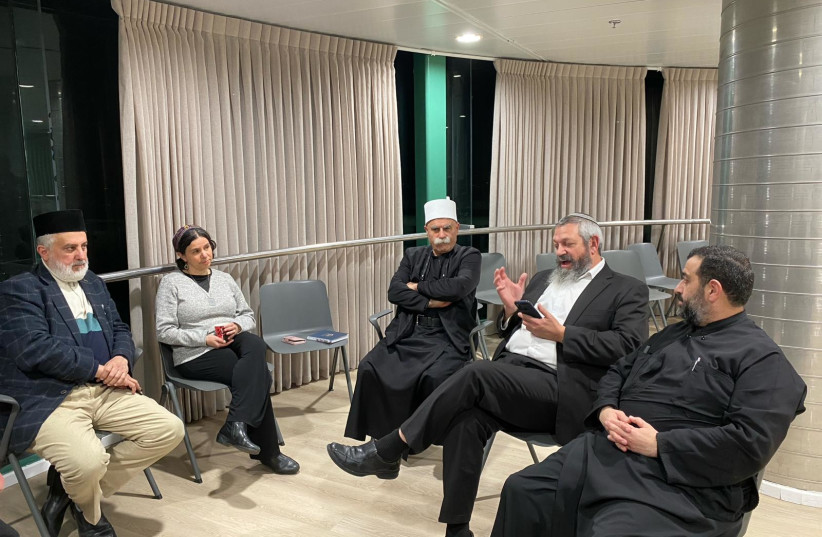A statement from 20 prominent religious leaders across the religious spectrum in Haifa was issued Monday, calling for cooperation, coexistence and respect between their religions amid heightened tensions after the October 7 massacre.
Signatories included Muslim and Druze imams, rabbis, priests, heads of religious organizations, and community members.
The statement was issued in collaboration between University of Haifa’s Laboratory for Religious Studies and the Ministry of Interior's Department for Religious Communities. This is the first time such a diverse array of religious leaders publicly backed such a partnership.
“We, representatives from the Jewish, Muslim, Christian and Druze religious communities in Haifa, gathered in recent months at the behest of University of Haifa’s Laboratory for Religious Studies and the Ministry of Interior Affairs department for religious communities in order to become better acquainted with each other and each person’s religious beliefs,” the statement began.
“During this difficult and tense period, we saw how critical it is to establish a group of religious leaders of various faiths who could promote being respectful neighbors for the sake of upholding the diverse fabric of life of our city.”

Additionally, the group formed a steering committee that will work to be a resource for communities in conflict or experiencing heightened tensions. Signatories hope that this initiative will lead to more examples of faith leaders acting as ambassadors of peace and dialogue.
Inter-faith dialogue at the university
At the University of Haifa, Arabs comprise 40% of the school’s student body. Among the university's students, 47% of its undergraduates are in the first generation of their family to enroll in higher education and 84% are from the northern Israeli periphery.
The University’s Laboratory for Religious Studies spearheaded six intensive sessions of dialogue prior to the release of this statement that were facilitated by the NGO Search for Common Ground.
The Laboratory, which offers research initiatives and public outreach with the goal of facilitating inter-religious dialogue and understanding, identified a need for inter-community discussions in the aftermath of the October 7 massacre and during the Iron Swords War.
The statement noted that “trust between the members of the group grew incrementally, meeting after meeting, and served as a basis and model for religious communities that each of us represent. The personal security of all of us rests on our internal cooperation, our ability to reduce friction and be a source of inspiration for respectful discourse which strives for being agreeable between neighbors.”
“This is a statement where close to 20 leaders — men, women, Jews, including Orthodox, Chabad, and Reform, Muslims, Christians, and Druze — all expressed how they value working together and how they would like to treat each other with dignity and tolerance in order to maintain the kind of peace you see in mixed cities in Haifa,” said Uriel Simonsohn, head of the laboratory and senior lecturer at the university.
The statement continued, “Haifa, our beloved city, is defined by its different groups and communities, which is a mosaic of diversity that sits between the Carmel Mountains and the Mediterranean Sea. We are all interested in the prosperity of this city and its residents, which stems from a deep commitment to the State of Israel and its laws.”
Simonsohn argued, “From my perspective, this is the greatest achievement of the laboratory thus far. A short while ago, it wasn’t even possible for many of these people to be in the same room together, but now they’re willing to listen to each other with respect and be patient.”
The statement added that the notion of tolerance and mutual respect are values upheld across Abrahamic faiths. “The dialogue shared between us where we uphold tolerance and mutual respect is anchored in our respective traditional scriptures that we all share. The Bible says we are all God’s creation. Psalm 24:1 states that, ‘The earth is the Lord’s and the fullness thereof; the world; and they that dwell therein.’ In Islam, the Koran states that all creatures are children of God and most beloved in the eyes of Allah is the one who does good to the children of God.”
